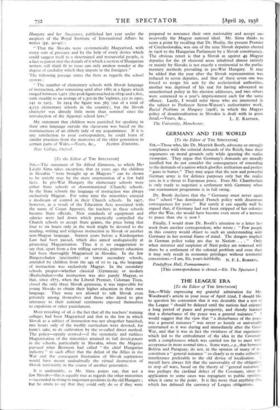GERMANY AND THE WORLD
[To the Editor of THE SPECTATOR]
SIR,—Those who, like Dr. Meyrick Booth, advocate so strongly compliance with the colonial demands of the Reich, base their arguments on moral grounds only while ignoring the realist viewpoint. They argue that Germany's demands are morally justified but do not consider the consequences of conceding to the demands of a nation which glorifies militarism and prefers "guns to butter." They may argue that the new and powerful German army is for defence purposes only but the realist sees in it a threat to European peace. Even Mr. Chamberlain is only ready to negotiate a settlement with Germany when our rearmament programme is in full swing.
Dr. Booth declares that the "Germany must never again rise" school "has dominated French policy with disastrous consequences for years." But surely it can equally well be argued that, if Germany had not been stripped of her colonies after the War, she would have become even more of a menace to peace than she is now ?
Finally, I would draw Dr. Booth's attention to a letter last week from another correspondent, who wrote : "Few people in this country would object to such an understanding with Germany in her normal frame of mind. The dangers implicit in German policy today are due to Nazism . . " Only when mistrust and suspicion of Nazi policy are removed will there be a settlement of the colonial problem and even then it may only result in economic privileges without territorial concessions.—! am, Sir, yours faithfully, N. F. L. ROBERTS.
Pendyffryn Hall, Penmaenmawr.
[This correspondence is closed.—En. The Spectator.]


























































 Previous page
Previous page